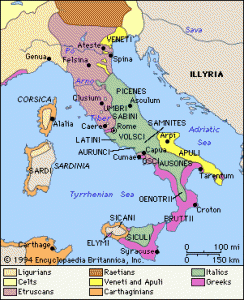De origine latinae linguae (About the origin of Latin) Posted by leire on Dec 15, 2011 in Latin Language
Before returning to the lessons on grammar, syntax and purely linguistic subjects, let’s place Latin language’s origin on it’s geographical and historical context.
A few tens of kilometers from the mouth of the Tiber River was a region of marshy plains and hills sparsely populated in prehistoric times. Is the region of Rome and since the Bronze Age in the vicinity of Palatine and Aventine human settlements have been identified by archaeologists.
Coinciding with the founding in southern Italy of the first Greek colonies (Cumae was founded in 750 BC), the city of Rome was born on 21 April 753 BC. This region was called in Latin Latium (Lazio in Italian). The inhabitants of this region were called latini (Latins) and spoke a language called lingua latina (Latin). The Latin language was originally the language of the city of Rome and the Latium Region. It is an Indo-European language (a language family diffused in Europe and South Asia), and therefore sister of other languages as Greek and Sanscrit. Thanks to the research done we can relate Latin with other languages used on the Italian Peninsula in ancient times, as Oscan and Umbrian. All these languages come from one common language or previous unit that is known as Italic.
First evidence
The first written evidence in Latin dates from around year 500 BC. At this time Rome was under the power of the Etruscans and Romans adopted writing from them. The Etruscans, in turn, took writing from Greeks settled in Magna Graecia, in Cumae.
Traditionally the so-called Praeneste fibula (brooch of Palestrina) was considered the first written evidence in a variety of Latin from the city of Praeneste, now Palestrina, around mid-sixth century BC. Its authenticity is being discussed, so nowadays it is usually considered Lapis Niger or Lapis Romulus (Stone of Romulus, said to be on his grave ) the oldest written record in Latin (5th century BC). It was found in the Republican Forum area near the Curia.
Then, over a period of two centuries, until the 3rd century BC, they did not produce any literary expression in Latin, activity for which the Romans themselves preferably selected Greek.
From this period we have inscriptions of various kinds from Rome and its nearby region and hearsay passed evidencies written later by other authors. We emphasize Lex Duodecim Tabularum or Duodecim Tabularum Leges (the Law of the Twelve Tables), preserved in some fragments from about 450 BC, the epitaphs of the Scipios, and so on.
It was not until the 3rd century BC there was a great revolution in the Latin language, especially in the evolution of vowels and they began to fix the syntactic patterns of subordination. Greek influence during this period is very obvious, resulting in a large number of Greek loanwords: tyrannus,-i; philosophus,-i; chorus,-i; theatrum,-i… This influence is also evident in the early Latin literature. The first Latin literary work that we know (partially) is Odusia, an adaptation of the verses of Homer’s Odyssey to Romans’ language, written by the Greek origin libertus,-i (freedman) Lucius Livius Andronicus. In any case, now I will not go more on this subject because it deserves a full post dedicated to Latin literature. Let’s just have a look at the first book of this work, enjoy it!
Odusia. Liber I, fragmenta I-VIII / Odusia. Book I, fragments I-VIII
| Virum mihi, Camena, insece versutum (Od 1, 1) | tell me, O muse, about the skillful man |
| Pater noster, Saturni filie,(Od 1, 45) | our father, son of Saturn… |
| Mea puer, quid verbi ex tuo ore supra fugit? (Od 1, 64) | my daughter, what statement flies up out of your mouth? |
| Neque enim te oblitus sum Laertie noster, (Od 1, 65) | Indeed I have no forgotten you, our Laertes |
| argento plybro, aureo eglutro (Od 1, 136-7) | in a silver washbasin, with a golden pitcher |
| tuque mihi narrato omnia disertim; (Od 1, 169) | and you shall openly tell me everything |
| Quae haec daps est? Qui festus dies? (Od 1, 225-6) | What is this banquet? What holiday is it? |
| … matrem procitum plurimi venerunt, (Od 1, 248) | … very many have come to call upon my mother |

Build vocabulary, practice pronunciation, and more with Transparent Language Online. Available anytime, anywhere, on any device.





Comments:
Connor:
wondered if you could help me,
i am having a tattoo which reads mother, father, sister in Latin
but when I try to translate into Latin I get several translations
for example is mother ‘mater’ or matrem’ ?
Yannis:
It depends what exactly you are trying to say. For instance, ‘mater’ is in the nominative form and thus the subject of the sentence. ‘Matrem’ is in the accusitive form and is thus the object of the sentece. In your case, I believe you want them to be in the nominative form so:
Mater, Pater, Soror
Cheers
Phillips:
Could I ask your assistance in translating the ancient Greek saying -” where there is sea there are pirates”
Thanks